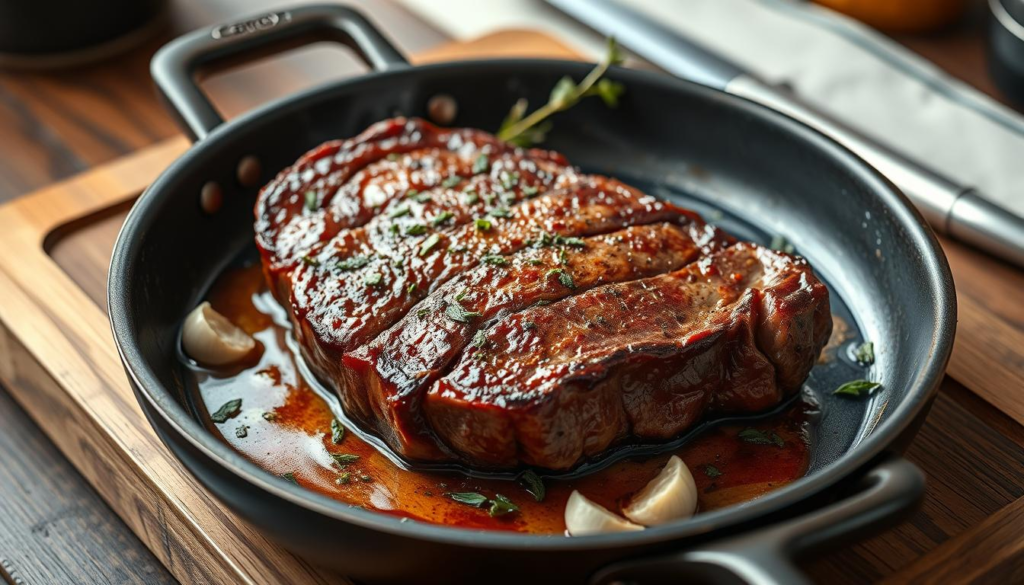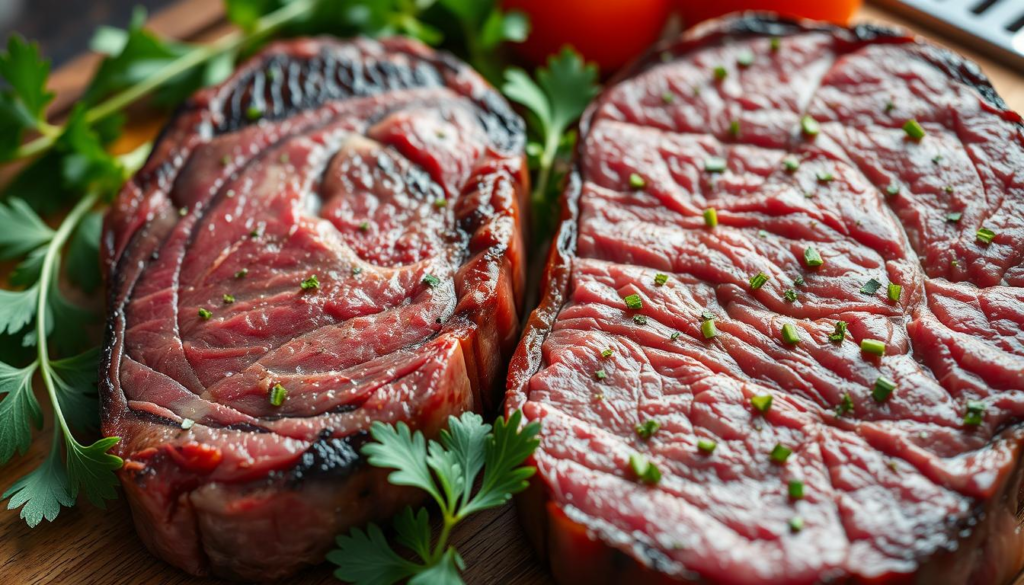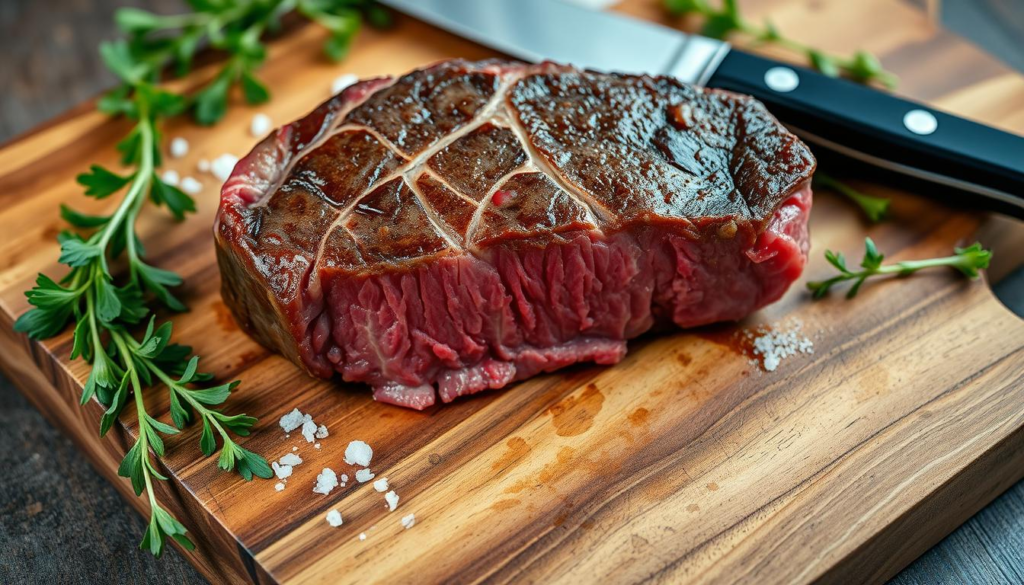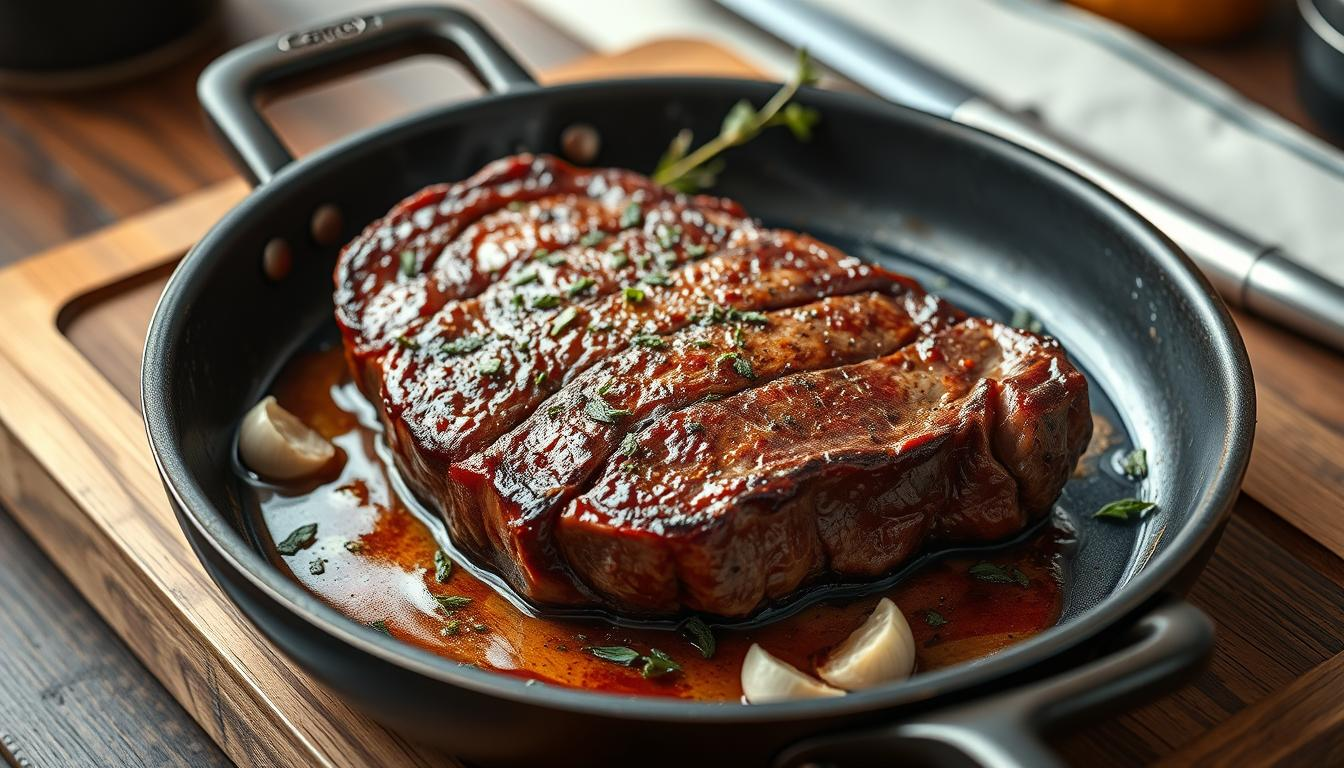Ever wonder how chefs make excellent steaks at home? The secret might be mastering the Culotte steak. It’s a hidden gem that turns home cooking into a unique experience.

The top sirloin cap, or culotte steak, is an excellent choice for steak lovers. It’s tender and rich, just like premium cuts, and when cooked right, it’s a real treat.
Whether you’re experienced or new to cooking, making a tremendous culotte steak is easy. Let’s explore how to make this cut into a memorable meal.
Table of Contents
Understanding the Coulotte Steak: A Premium Cut of Beef
The culotte steak, also known as the rump cover or picanha steak, is a hidden gem in the world of premium beef. It offers a unique and flavorful experience and stands out from more common beef selections.
Beef enthusiasts love the culotte for its unique qualities. The petit filet section is tender and rich in flavor, making it a prized choice for cooks and diners.
What Makes Coulotte Steak Special
The Coulotte steak has qualities that make it stand out:
- Exceptional marbling that enhances flavor
- Tender texture with robust beef profile
- Versatile cooking methods
- Ideal for grilling and roasting
Halal Certification and Selection
When choosing a high-quality culotte steak, consider these critical factors:
- Verify official halal certification
- Check sourcing from reputable suppliers
- Examine meat processing standards
Quality Indicators to Look For
To ensure a premium cut, look for these quality indicators:
- Color: Bright red with consistent marbling
- Texture: Smooth and firm
- Fat distribution: Even white streaks throughout the meat
Understanding these key aspects helps you choose and prepare a delicious culotte steak. It will impress even the most discerning meat lovers.
Essential Tools and Equipment for Cooking Coulotte Steak
You need more than good meat to make a tasty rump cap steak. The right tools can make your culotte steak truly stand out. Let’s look at the must-have equipment for every home chef to cook this premium cap steak.

- Heavy-cast iron skillet or grill pan
- Precise digital meat thermometer
- Sharp chef’s knife
- Cutting board with juice groove
- Tongs for handling meat
- Aluminum foil for resting
A top-notch meat thermometer is key for cooking culotte steak. It helps you get the meat just right without overcooking it.
| Tool | Purpose | Recommended Type |
|---|---|---|
| Skillet | High-heat searing | Cast iron preferred |
| Thermometer | Temperature monitoring | Digital instant-read |
| Knife | Trimming and slicing | 8-inch chef’s knife |
Invest in top-grade tools to improve your rump cap steak cooking. Quality equipment means you’ll get restaurant-quality results every time.
Preparing Your Top Sirloin Cap for Cooking
Preparing a top sirloin cap steak needs careful attention. Your boneless sirloin cap should be ready for a tasty and tender meal. The proper steps can make an ordinary cut into a special dish.

Trimming and Portioning
When working with a top sirloin cap steak, trimming is key. Here are the essential steps:
- Remove any excess fat beyond a thin layer
- Trim silver skin carefully with a sharp knife
- Cut the boneless sirloin cap into even portions
Seasoning Techniques
Seasoning can make your top sirloin cap steak stand out. Here are some tips:
- Pat the steak completely dry with paper towels
- Use coarse kosher salt generously
- Apply freshly ground black pepper
- Optional: Add garlic powder or herbs for extra flavor
Room Temperature Guidelines
It is essential to bring your boneless sirloin cap to room temperature. Remove the steak from the fridge 30-45 minutes before cooking to ensure even heat.
| Steak Weight | Room Temp Time | Recommended Preparation |
|---|---|---|
| 8-10 oz | 30 minutes | Standard preparation |
| 12-16 oz | 45 minutes | Extended tempering |
Please follow these steps to ensure the perfect top sirloin cap steak. It’s sure to impress.
Best Cooking Methods for Coulotte Steak
Cooking a picanha or culotte steak requires precision and knowledge of different techniques. The rump cover is a versatile cut well-suited to various cooking methods, each bringing out unique flavors and textures.
Here are three main cooking techniques to make your culotte steak a restaurant-quality dish:
- Grilling
- Ideal for achieving perfect character marks
- High heat helps develop a crispy exterior
- Best for outdoor cooking enthusiasts
- Pan-Searing
- Creates a delicious golden-brown crust
- Works well in kitchen environments
- Allows for precise temperature control
- Oven-Roasting
- Ensures even cooking throughout
- Perfect for more significant cuts of picanha steak
- Helps retain moisture and tenderness
Each method has its benefits for cooking your culotte steak. Your choice depends on the equipment you have, your personal preference, and what you want to achieve.
| Cooking Method | Pros | Recommended Heat |
|---|---|---|
| Grilling | Smoky flavor, beautiful grill marks | High (400-450°F) |
| Pan-Searing | Quick preparation, crispy exterior | Medium-high (375-425°F) |
| Oven-Roasting | Even cooking, moisture retention | Medium (350-375°F) |
Master these techniques to take your culotte steak from good to extraordinary. Impress your family and friends with your cooking skills.
Temperature Guide and Cooking Times
Getting the perfect doneness for your top sirloin cap is key. The right temperature makes your petit filet truly special. It ensures a great meal every time.
Understanding Doneness Levels
You must watch the temperature closely to get the perfect rump cap steak. Here are the primary doneness levels:
- Rare: 125°F (internal temperature)
- Medium Rare: 135°F
- Medium: 145°F
- Medium Well: 150°F
- Well Done: 160°F
Meat Thermometer Mastery
A good meat thermometer is essential for the perfect steak. Put the probe in the thickest part of the top sirloin cap. Make sure it’s not in fat or bone. Check the temperature often to avoid overcooking.
The Critical Resting Period
After cooking, let the steak rest for 5-10 minutes. This step makes the steak tender and flavorful. To keep it warm, could you cover it loosely with foil?
Pro tip: The steak’s temperature will go up 5-10 degrees while it rests. So, could you take it off the heat before reaching your desired doneness?
Serving Suggestions and Complementary Sides
Your culotte steak needs an excellent presentation to showcase its rich flavor and tender texture. Choosing the right side is key. It should bring out the best in the top sirloin cap steak and balance the meal.
- Roasted vegetable medley with herb-infused olive oil
- Garlic mashed potatoes
- Grilled asparagus with lemon zest
- Wild rice pilaf
- Fresh Mediterranean salad
If you follow halal dietary rules, ensure all sides are halal, too. Choose fresh, seasonal ingredients that match the steak’s bold taste.
| Side Dish Category | Recommended Options | Flavor Profile |
|---|---|---|
| Starches | Quinoa, Couscous, Roasted Potatoes | Neutral, Absorbs Meat Juices |
| Vegetables | Grilled Zucchini, Roasted Bell Peppers | Light, Smoky, Complementary |
| Sauces | Chimichurri, Herb Butter | Fresh, Enhances Meat Flavor |
How you present the steak is just as important as how it tastes. Slice the top sirloin cap steak against the grain. Then, arrange it nicely on a warm plate. Add fresh herbs like parsley or thyme for a pop of color and a hint of aroma.
Related: Delicious Chuck Eye Steak: 30-Minutes
Conclusion
Cooking a perfect culotte steak is within your reach. This boneless sirloin cap offers a delightful culinary experience. By understanding its unique characteristics, you can make any meal special.
The Picanha steak, another name for culottes, is more than just a protein. It shows your cooking skills and love for quality meat. You can make this cut spectacular with the proper techniques, seasoning, and cooking methods.
Remember, great cooking is about passion, patience, and continuous learning. Embrace the process, experiment with different seasonings, and don’t be afraid to develop your unique approach to preparing this exceptional cut of beef.
FAQ
What is a culotte steak, and how is it different from other beef cuts?
The culotte steak, also known as the top sirloin cap or picanha, is a flavorful and tender cut. It comes from the top of the sirloin and is known for its rich flavor and tender texture, thanks to a fat cap.
Unlike leaner cuts, the culotte steak has a lot of marbling, which makes it stand out from other beef cuts. Because of its tenderness and flavor, it’s great for many cooking methods.
Is coulotte steak halal-certified?
To get halal culotte steak, buy from a certified halal butcher or meat supplier. These butchers follow Islamic dietary rules, which means the animal was slaughtered correctly, with the proper blessing and preparation.
What are the best cooking methods for culotte steak?
You can grill, pan-sear, or oven-roast culotte steak. It’s best cooked at high heat to get a nice crust. Grilling and reverse searing are top choices to bring out the steak’s flavors.
How do I know when my Coulotte steak is cooked to the right temperature?
Use a meat thermometer to check the temperature. For medium-rare, aim for 130-135°F. Let the steak rest for 5-10 minutes after cooking.
This lets the juices spread out, making the steak more tender.
What are the best seasonings for Coulotte steak?
For a simple taste, use kosher salt and black pepper. Try a dry rub with garlic powder, paprika, and herbs for more flavor. Stick to herb and spice blends for halal-compliant flavors.
How should I store and prepare Coulotte steak before cooking?
Take the steak out of the fridge 30-45 minutes before cooking. Pat it dry with paper towels for better seasoning and browning. Store unused steak in the coldest part of your fridge. Use it within 3-5 days.
What side dishes pair well with Coulotte steak?
Try roasted vegetables, cauliflower rice, grilled asparagus, or a fresh herb salad. Starchy sides like roasted potatoes or quinoa pilaf also work well. They balance the rich flavor of the steak.
Can I cook Coulotte steak from frozen?
It’s best not to cook culotte steak from frozen. Thaw it in the fridge overnight for even thawing. Thawing at room temperature can lead to bacterial growth and affect the steak’s quality and safety.

